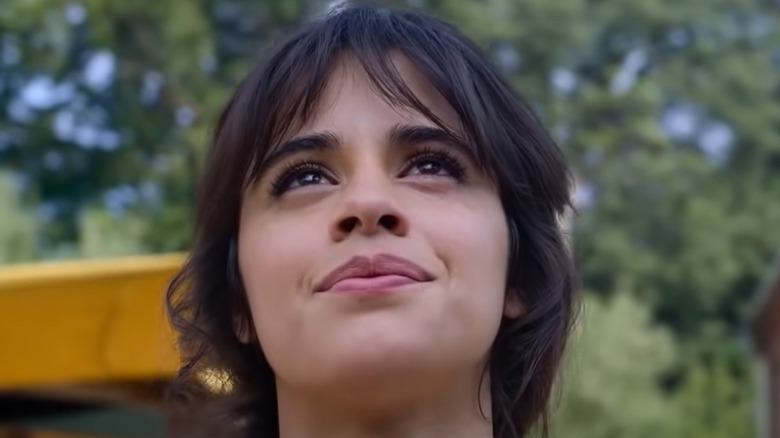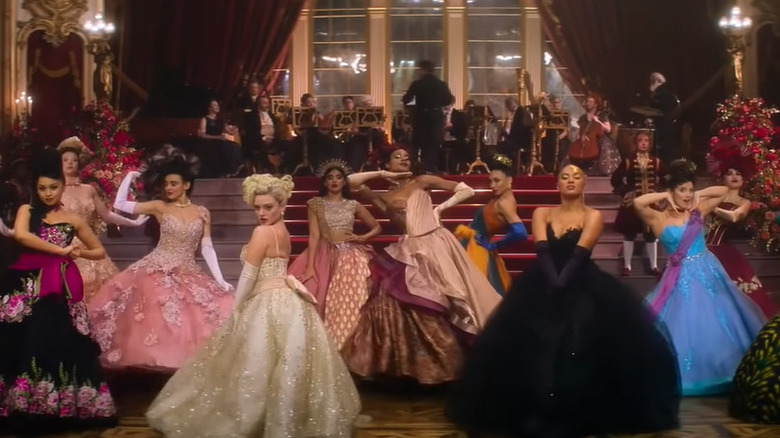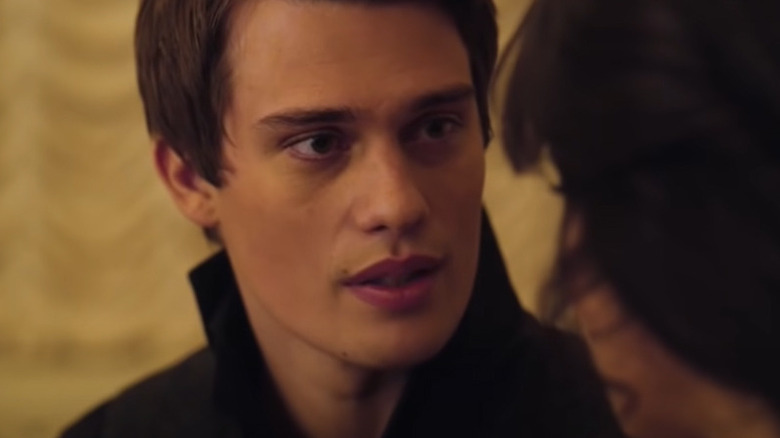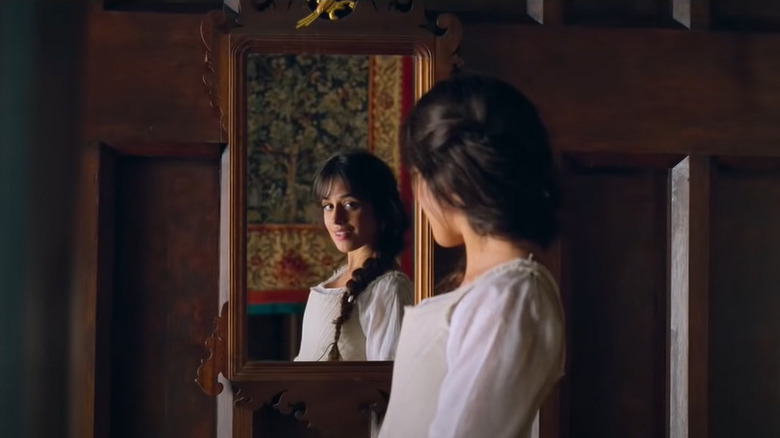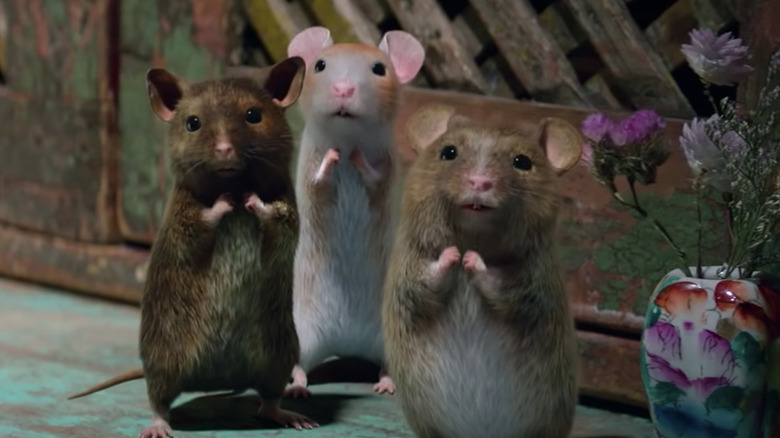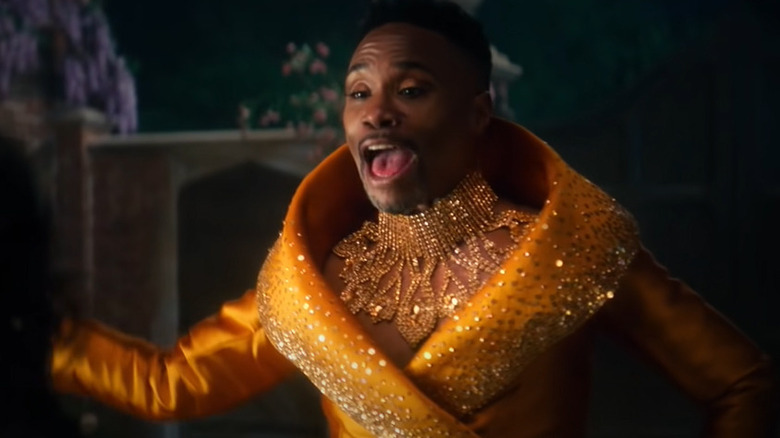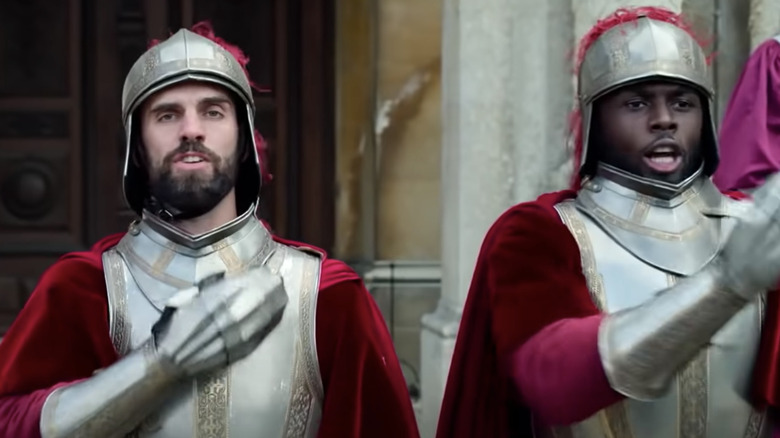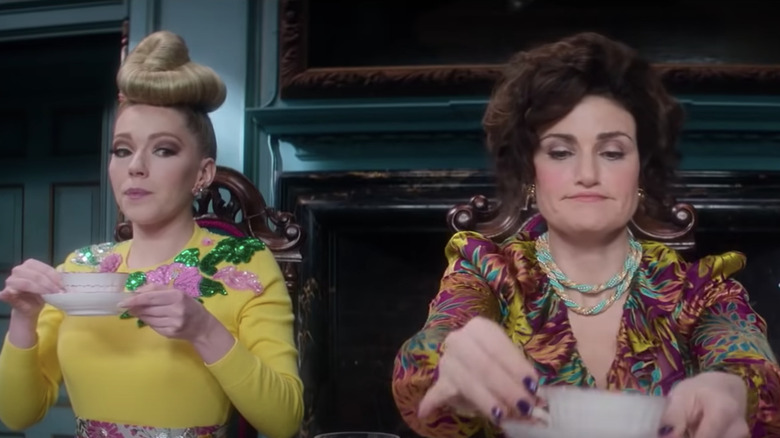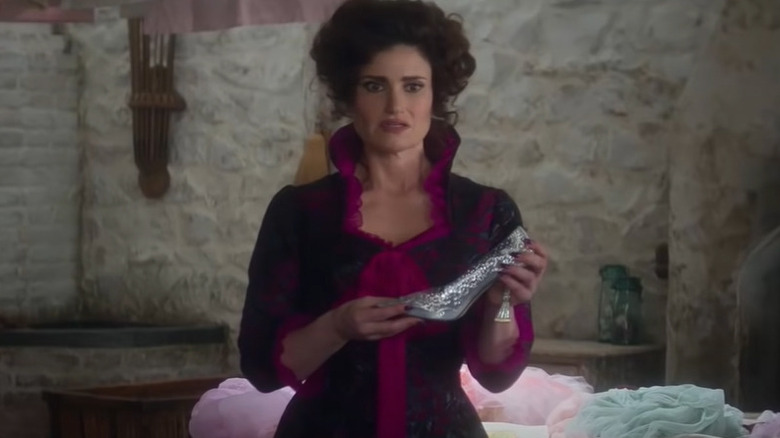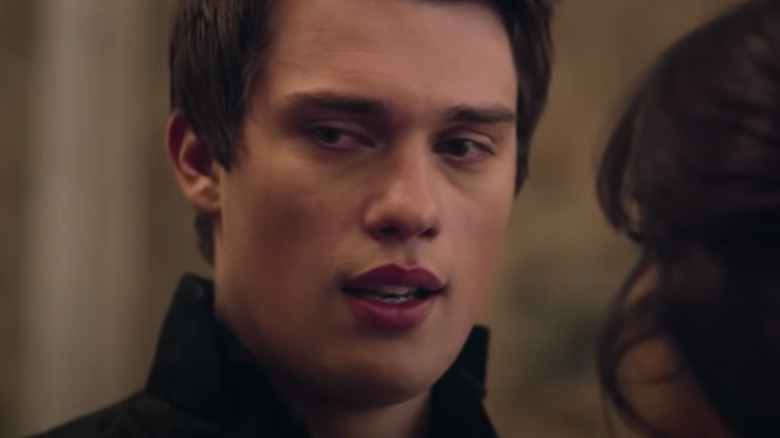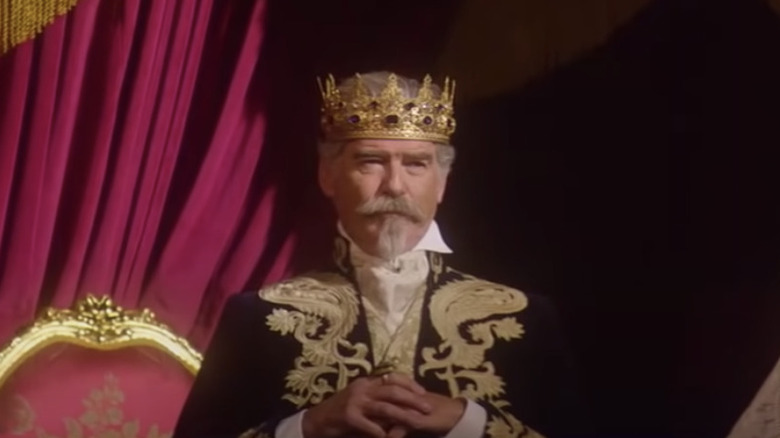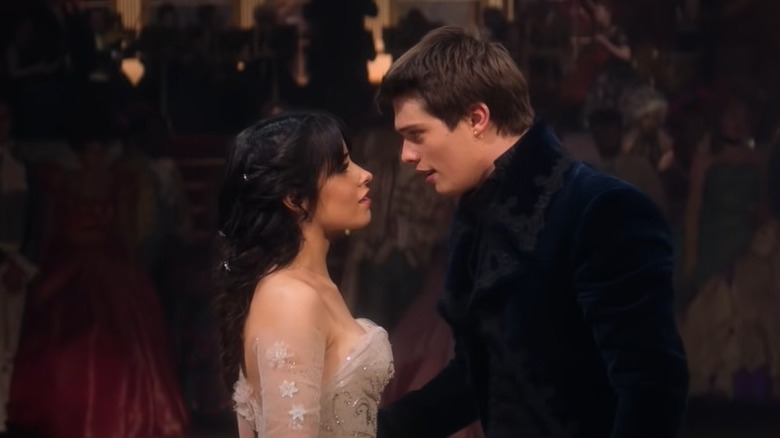Things Only Adults Noticed In Amazon's Cinderella
We've seen the "Cinderella" story told a dozen different ways, but we've never seen everyone's favorite underdog princess like this. 2021's "Cinderella" puts a feminist twist on the classic tale: This Cinderella — Ella to her friends — chooses herself.
One of the most significant criticisms of princess-centric movies is their tendency to portray women as expendable damsels. Often, they lack agency over their own lives and give up their hopes and dreams for a prince they've known for five minutes. Recall Belle falling in love with the very Beast who kidnaps her, or Ariel giving up her voice for a boy she's never really met. Yet Amazon's "Cinderella" takes us in another direction entirely. Ella (Camila Cabello) and Prince Robert (Nicholas Galitzine) are role models parents would be proud to see their children emulate.
Though this movie's positive spin on the classic princess tale removes a lot of its creepy underbelly, there's still a whole lot of stuff within it that goes right over kids' heads. From deep-cut jams to references to the real-world history of monarchy, these are the things only adults noticed in Amazon's "Cinderella." Spoilers ahead!
A blast from the musical past
Kids who aren't well-versed in music history might think most of the music in "Cinderella" is original. However, the movie is actually littered with many delightful takes on '70s, '80s, and '90s music. The first song Cinderella sings isn't original to the movie at all, in fact: It's a take on the 1994 song "You Gotta Be" by R&B artist Des'ree.
Younger audiences might recognize certain other classic songs, like Prince Robert's version of Queen's "Somebody to Love," or Vivian's (Idina Menzel) rendition of Madonna's "Material Girl." Less omnipresently popular songs will probably elude them, however — but not the adults in the audience, who will be jamming until the end. Salt-N-Pepa's "Whatta Man" appears, as does Earth, Wind & Fire's "Shining Star," expertly performed by Billy Porter's Fab G. Jennifer Lopez's 1999 hit, "Let's Get Loud," provides the last significant musical number.
Original songs like "Million to One" round out the soundtrack, as do more recent numbers. Prince Robert and Ella's charming slow dance to Ed Sheeran's "Perfect" is especially memorable. But otherwise, this movie is a master class in recent music history. If kids haven't heard these jams before watching, they'll certainly be blasting them on repeat now.
Princess Laura's killer burn
"Cinderella" has a number of fairly unsubtle innuendoes (we're looking at you, mice), but Princess Laura's is especially attention-grabbing. We'd expect nothing less from the posh-yet-savage princess: We only get to know her for a few minutes, but she completely steals the show. In her dismal meeting with Prince Robert, during which she condescendingly explains to him what a map is, she tries to arrange a mutually beneficial marriage. She leaves frustrated when Robert shows no interest in her proposal, even though she's perfectly chill with him hanging out with his bros and never spending time together.
When she leaves the meeting in a huff, she gets the last laugh when she addresses the other princess hopefuls, saying, " He's not working much upstairs, and I'd be surprised if it was different elsewhere." Lord Reginald's daughter, who is nothing if not a firecracker, adds, "She knows what I'm talking about," indicating one of the giggling girls. Laura's dig criticizes his upstairs brain and his downstairs brain, calling into question whether or not he'd even be worth a romp in the hay. Ouch, Laura.
Ella is fine just the way she is
Here's a sentiment every woman is tired of hearing: "You'd be prettier if you did x, y, and/or z!" Countless women throughout history have dealt with this condescending "compliment." While young girls certainly face their fair share of criticism, this particular bit of nastiness is most often applied to adult women. Women who tear other women down out of internalized misogyny also use this line, something "Cinderella" vividly captures: Ella's stepmother Vivian constantly does this to her stepdaughter. "You could be so pretty if you took even a second to comb that hair of yours," Vivian tells Ella at one point. Never mind that Vivian forces her stepdaughter to live in a dingy basement with a few mice and a spider-turned-Fabulous Godparent.
The misogynistic undertones of most fairy tale-based movies are prominent, and it's refreshing to see a modern take turn these tropes on their head. This creates a more positive message and gives young women the tools they need to call out this behavior. Unlike most iterations of "Cinderella," this story's Ella doesn't need to change herself to win Prince Robert's favor: She catches his eye in a ragged dress and messy hair. Even when Ella prepares for the ball, she doesn't get made over into a glamorous stranger. She looks the same, in fact, except she's wearing the dress she designed. It's an empowering choice.
Lessons in mouse anatomy
Not everyone can be as subtle about innuendo as Princess Laura, but Ella's three best friends (yes, they're mice) try their hardest. When Fab G turns Ella's mice besties into three human footmen, Ella is confused to discover they're male. Her argument? "Because everyone knows that mice are girls and rats are boys." Um, that's not how that works, Ella.
James Corden's mouse-human asks the question on everyone's mind: "How do you think rats have more rats?" Fab G is quick to steer the conversation away from breaking the news to Ella that babies don't get delivered by storks. Things get even more uncomfortable after the mice drop off Ella at the palace. There, James Corden's mouse-human makes it weird again by announcing that he's relieved himself from his, um, front tail. Adults might find themselves pondering the biological implications of this: The relevant anatomy isn't that much different on a mouse, so it's pretty unclear how the heck he was relieving himself before becoming human. In the words of our sassy mouse friend, how does he think mice have more mice without a front tail? In the words of Fab G, "Moooooving away from that."
The Fabulous G of Broadway
Most kids watching "Cinderella" likely recognize Idina Menzel and Camila Cabello: Menzel voices Elsa of "Frozen" frame, and Cabello is a famous pop star. But kids tuning into this might not realize that Billy Porter is Broadway royalty. Porter hit the scene in the early '90s when he played Teen Angel in the 1994 "Grease" revival. More roles soon followed, culminating in the one that made Porter a household name in the world of theater: Lola in 2013's "Kinky Boots." Porter originated this role, and garnered multiple awards, including the Tony for Best Actor in a Musical, in the process.
While certain teens might recognize Porter from "American Horror Story" or "Pose," even they're likely ignorant of his luminous Broadway history. After watching "Cinderella," however, they might be inspired to check it out, as Porter is the perfect person to take on the role of Fab G. He always brings a unique pizazz to any part he takes on — especially ones as glamorous as this.
The chorus boy with a dark past
"Cinderella" makes a particularly macabre historical joke when King Rowan argues with Prince Robert about finding a wife. After the king screams "Silence!" a chorus boy pipes up: "A ball was a good idea." At face value, this seems pretty innocuous. They're talking about the prince's ball, after all. But it's not the words themselves that matter here — it's how the chorus boy sings them. He belts the line out in an incredibly high voice. As some music-history-savvy adults will realize, this is a reference to a horrific historical practice.
Back in 17th and 18th century Europe, certain young boys were castrated to produce singing voices of unique complexity and power. As if that weren't bad enough, the practice has a misogynistic origin: It began when women were banned from the stage in the 16th century, creating a need for male singers capable of filling soprano and contralto roles. Letting women perform seems like the more reasonable solution, but apparently society of the era preferred to perform a brutal, life-changing operation on young boys instead. This minor line is heavy with hideous historical significance.
Thomas Cecil is all too real
Thomas Cecil may seem like an average creep to kids watching "Cinderella," but his existence is a glimpse into a much larger problem. Historically, and in many areas today, daughters are treated more like commodities than actual people. Their parents are more interested in what they can get from them rather than what they can give them. We see this with how Vivian treats Ella: She tries to sell her off to the highest bidder for her own gain. It's not abundantly clear what age Ella is, but if she's over 18, it's not by much. Yet everyone's perfectly fine with her stepmother pawning her off to a creepy older man who wants to see how Vivian's "blossoming daughters are managing." Vomit cleanup on aisle two, please.
The time period the film takes inspiration from isn't wholly defined either, but child brides are all too common throughout history — and, sadly, even today. Young girls forced into such marriages face increased risks of domestic violence, sexually transmitted infections, pregnancy-related injuries, and death in childbirth. As the International Women's Health Coalition reports, "37,000 girls under the age of 18 are married each day." Sadly, the Thomas Cecils of the world are still at large.
Magical plot holes
Most kids would rather enjoy the movie than focus on its glaring plot holes. As it turns out, Fab G agrees with that sentiment. As the fairy godparent says, "Okay, let's not ruin this incredibly magical moment with reason." but adults can't help picking apart plotlines that don't make sense, even when magic is involved. For example, Fab makes it abundantly clear that when the clock strikes midnight, the magic will wear off. But despite the fact that magic does eventually flicker out of every single thing Fab G bewitched, the glass slippers remain intact. Huh?
We watch as Ella's dress flutters away into the wind, the human mice turn back into their four-legged selves, and the carriage transforms into a hunk of junk. Yet days after the ball, Ella still has a fully intact glass slipper hiding in her basket, while Prince Robert has the other one. That's not the only odd thing adults will notice, either. Is Ella's shoe size really that special that no one else matches it? Moreover, the prince has seen Ella both dolled up and in tattered clothes. If the shoe fits an entirely different woman, is he really ready to abandon everything he knows about Ella and run off with a rando? Is he completely face-blind? He doesn't even find her with the shoe, so this fairly nonsensical plotline isn't even necessary.
Sons over daughters
While "Cinderella" plays off the king's refusal to even consider Gwen as a successor to the throne as a comedic plot point, the sexism it portrays is very real. History is full of bloodshed that could have been averted, had daughters been able to act as heirs.
Take the tale of Henry VIII, for example. Infamously, he had Anne Boleyn beheaded on what many historians now believe to be false charges so he could marry yet again. In his desperation to father a son, he went through six wives. Yet producing a son with Jane Seymour still wasn't enough for Henry, who married three more times. He even had his 19-year-old bride Catherine Howard killed for alleged infidelity, because only he was allowed to cheat.
Catherine Parr, the last of Henry's wives, evaded execution and even got Henry to name his daughters as his successors. But the moral of the story is clear: The deeply-rooted misogyny of historic monarchies had deathly consequences. Your sexist nonsense isn't funny, King Rowan.
The king's little problem
Throughout "Cinderella," the king seems to be overcompensating for something. His frequent power trips aren't exactly out of character for a king, but his particular preoccupations imply he might be insecure about something only adults will take notice of.
King Rowan constantly talks about the size of everything around him. Characters bring up the fact that he's had his minions make his throne slightly larger not once, but twice. This bit of innuendo gets a laugh out of the older audience, to be sure. But it also develops into a lesson everyone can learn from. We all have things we're insecure about, regardless of our social status, fame, or fortune. But how we treat the people around us is more important than whatever trivial detail we agonize over. Despite the king's self-consciousness, he learns to stop putting down his loved ones and to respect and honor each of their strengths, regardless of the norms of the time. Talk about character growth.
Too soon, lovebirds
Whirlwind romances are the norm in princess films, but in reality, it takes time to get to know someone. Of course, in the eras that inspired the setting of "Cinderella," modern dating didn't exist. But an adult still can't help but flinch at Ella and Prince Robert's choices.
Proposing marriage after one date is absurd, and the prince is selfish to ask her to give up her dreams. However, the tables eventually turn when Prince Robert gives up his dreams for Ella's sake. But while Robert may say that he's not very interested in royal life or becoming king, he's making a very rash decision at a young age that will affect his life and the future of the kingdom. Robert does, at one point, even tell his father that there's nothing he wants more than to be king. He needs to give himself a chance to mature into wanting that role before running off with Ella, lest he come to resent her. There's no denying that Gwen is a better fit for the throne, and Ella and Robert don't get married immediately. But this is still a case of someone — a very young someone — giving up everything for another person. It's the prince instead of the princess this time, but it still demonstrates a lack of foresight the grown-ups the in audience will recognize as potentially destructive.
